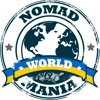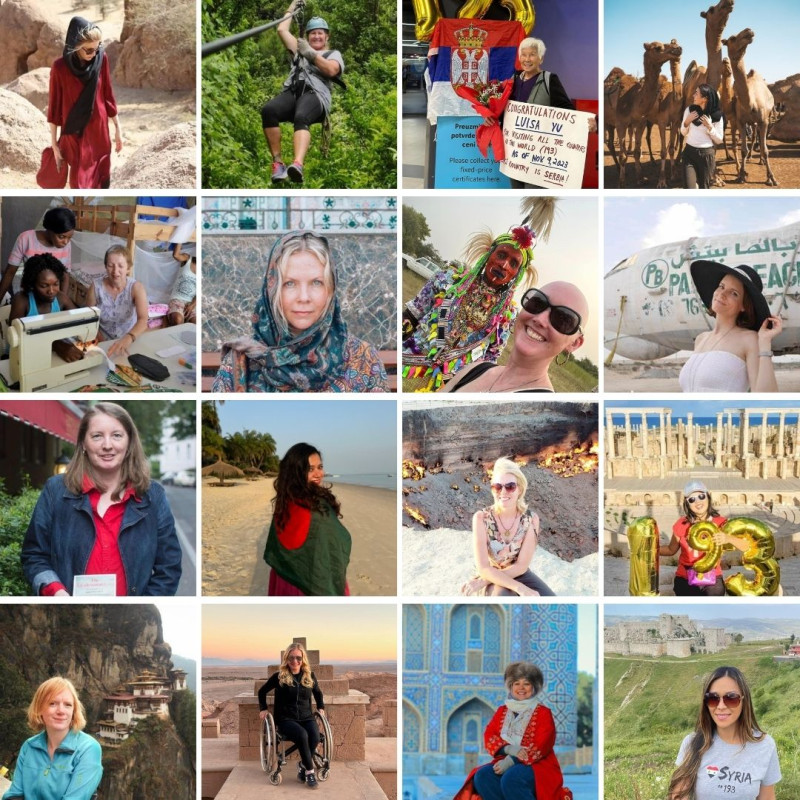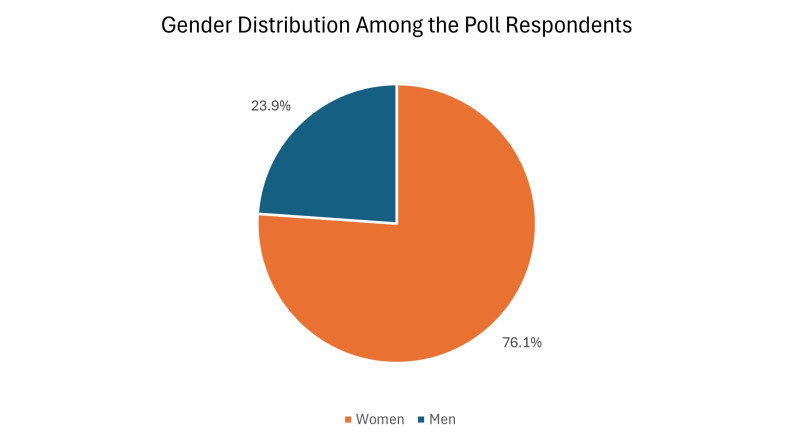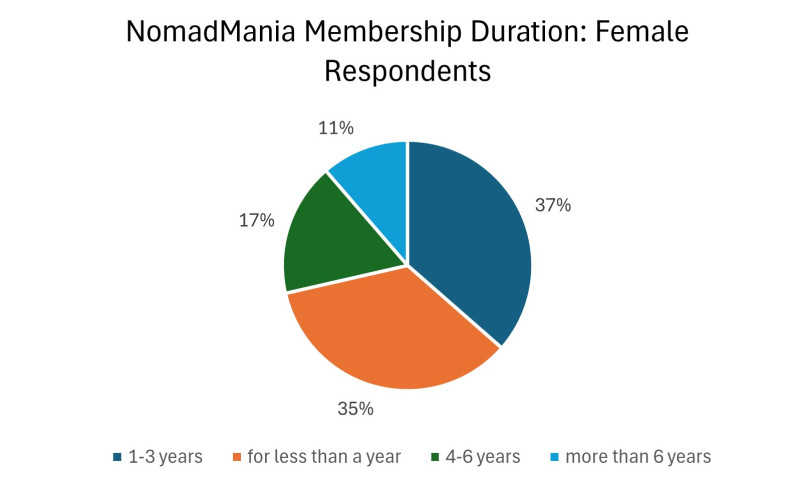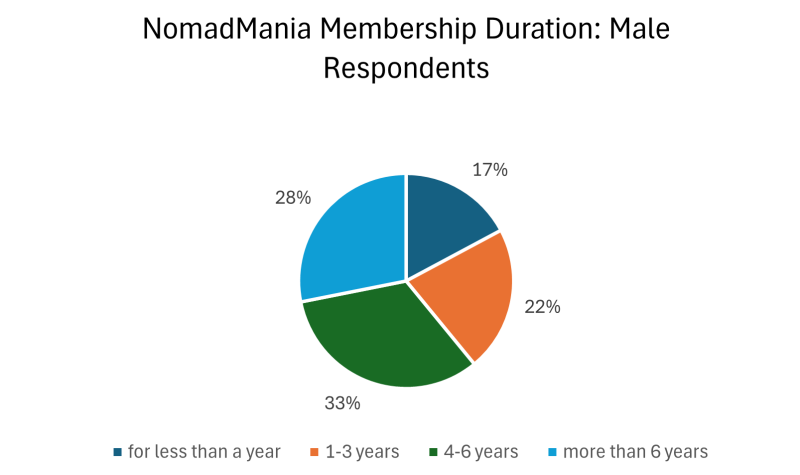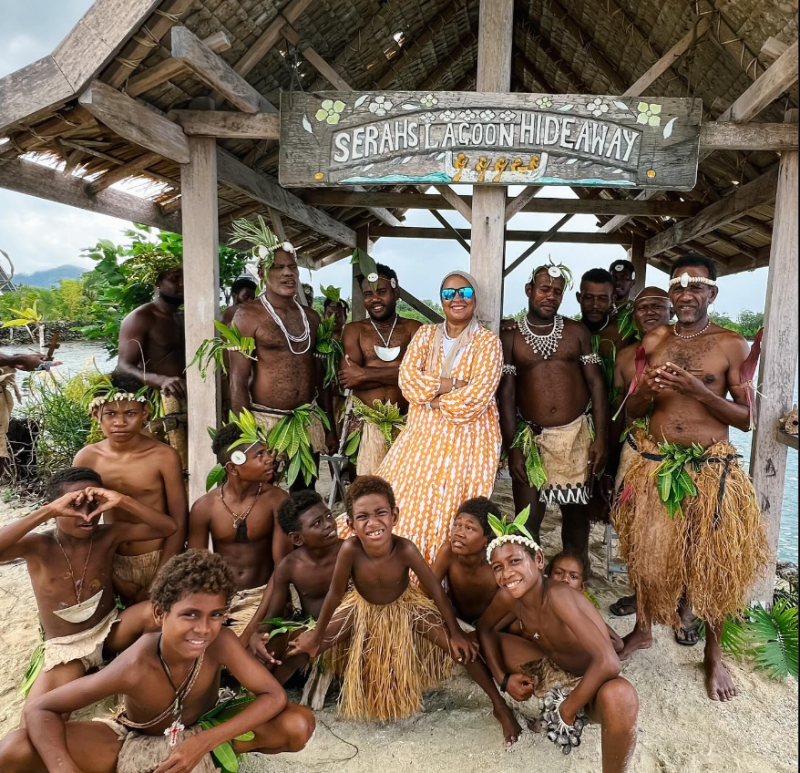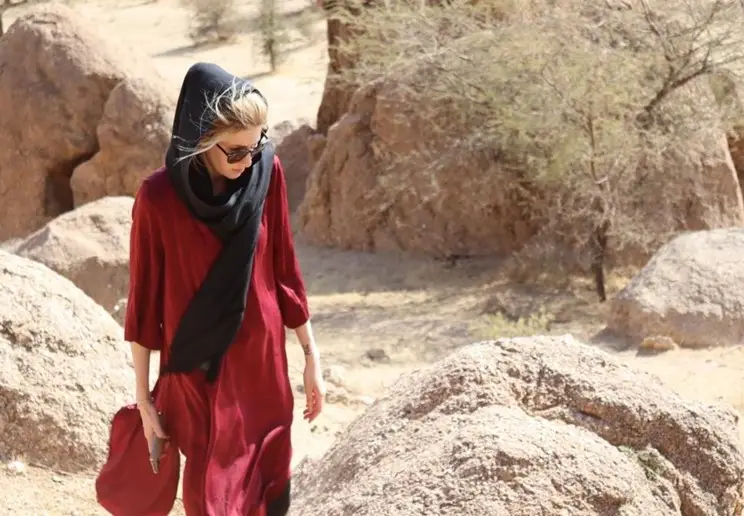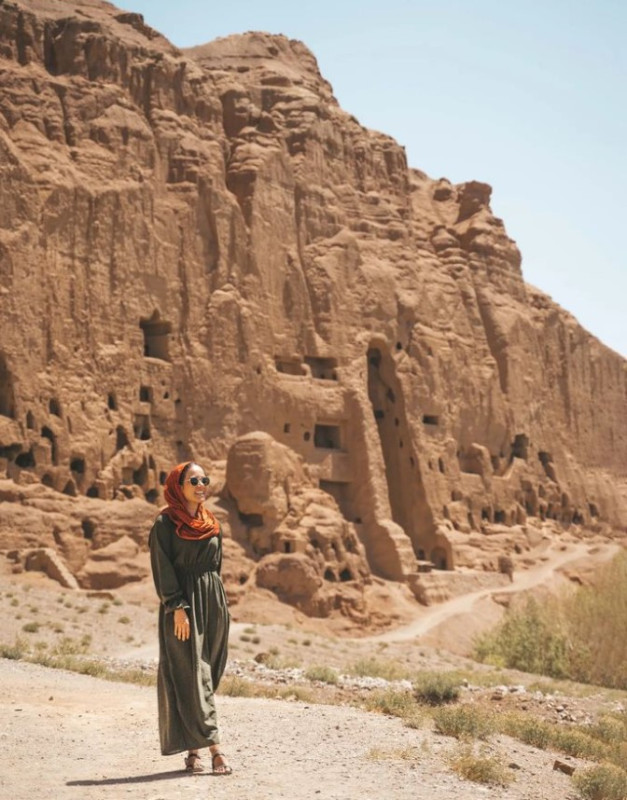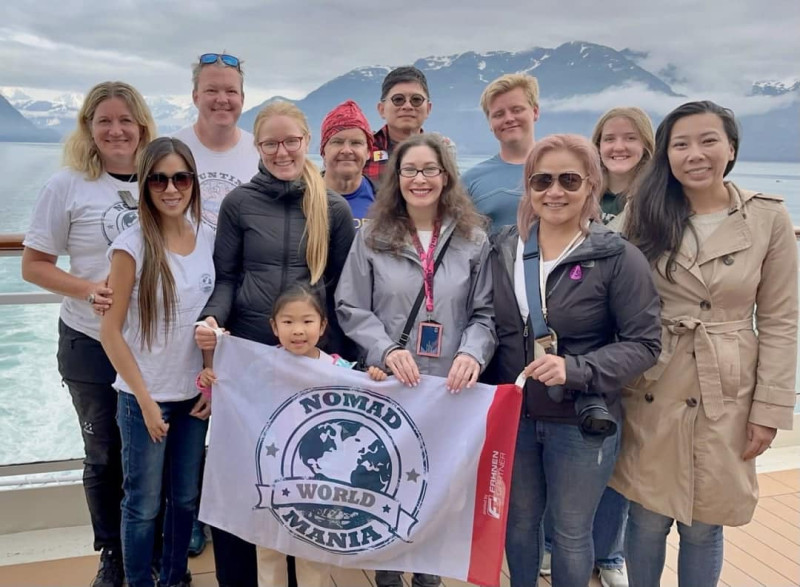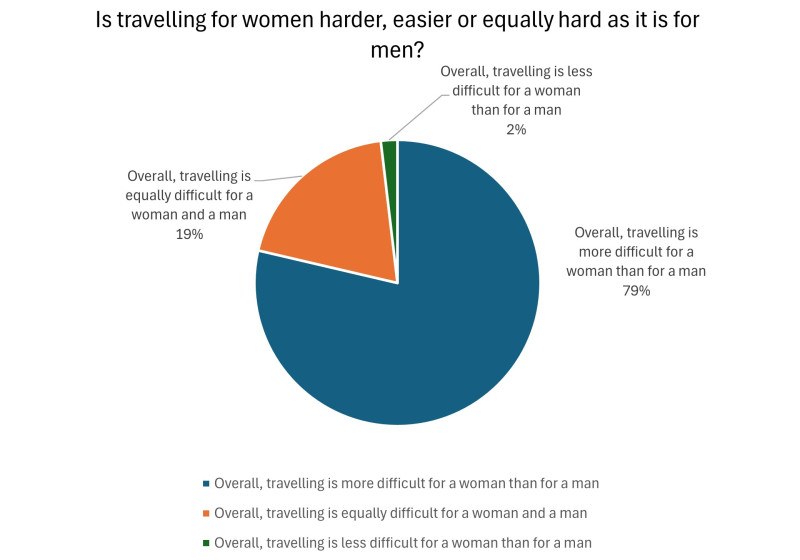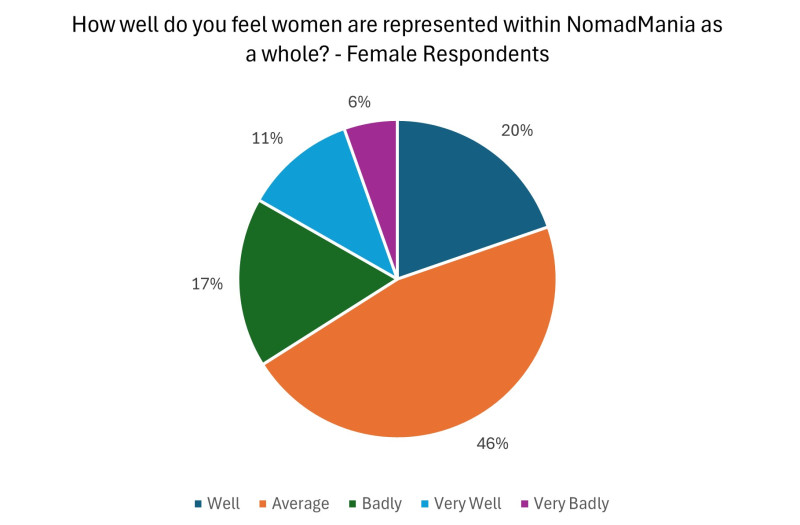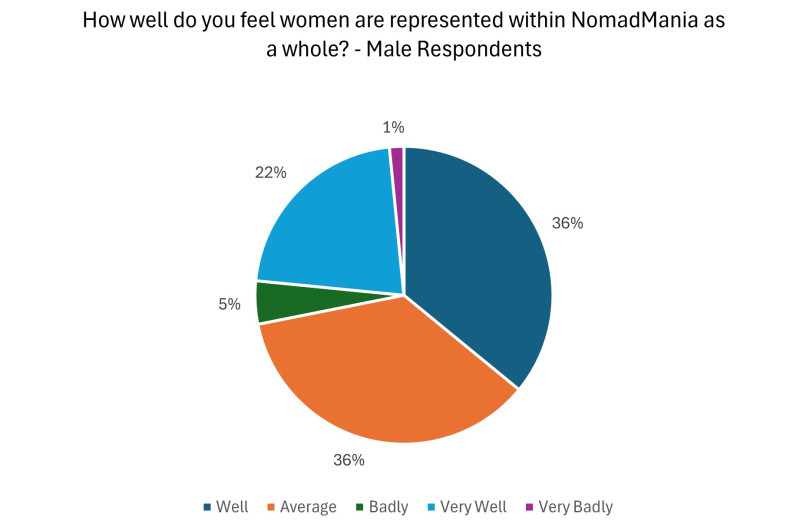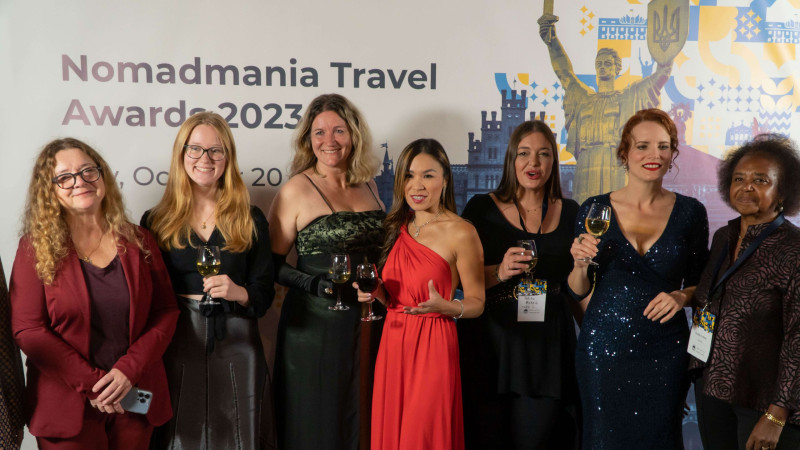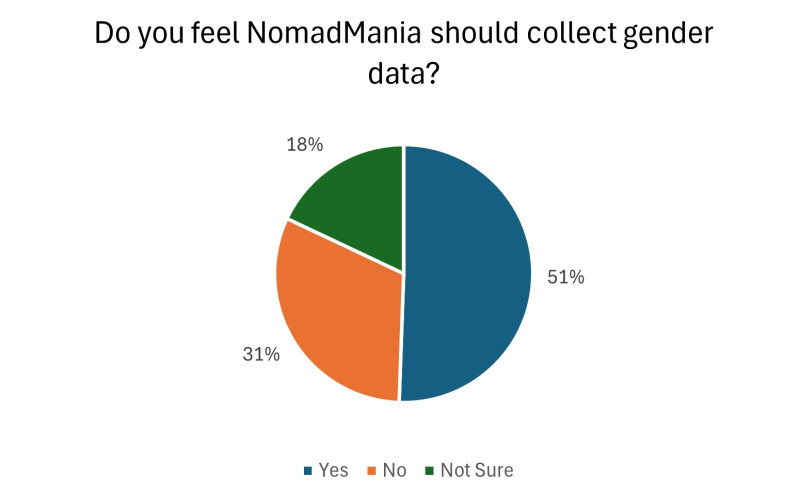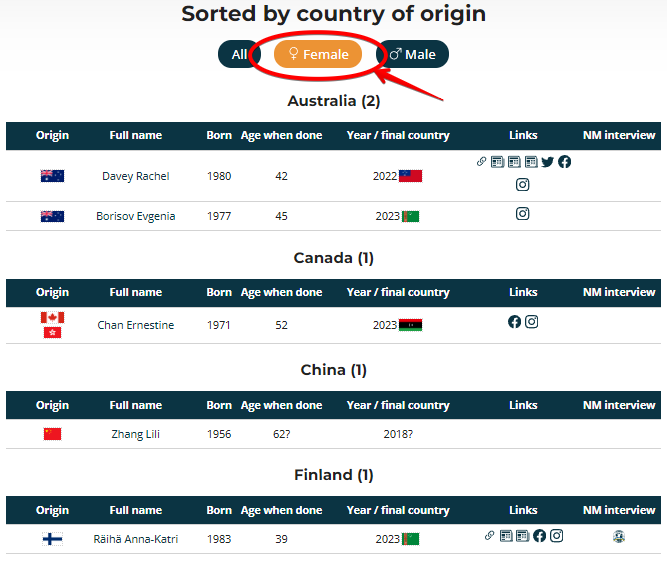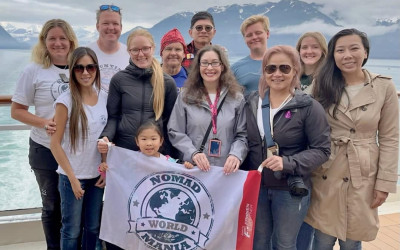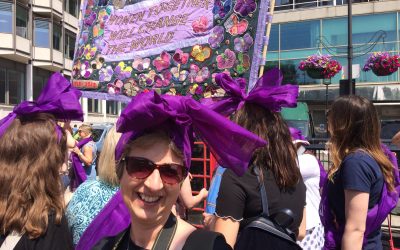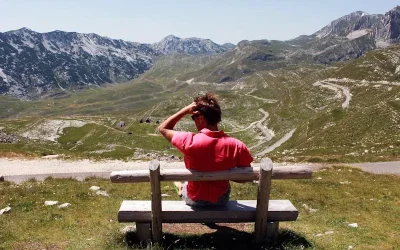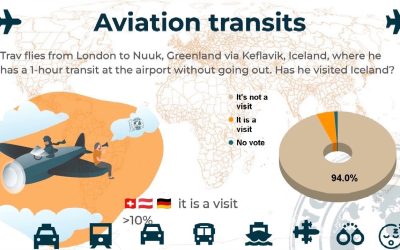We believe our “Women in Travel” poll was thought-provoking and much-needed, and the results we’re sharing will provide valuable insights into women’s experiences in travel. We’re grateful to everyone who took the time to share their perspectives with us.

Responders’ Profiles Overview
We invited all our members to participate in the poll, but it’s noteworthy that we received 204 responses from women and only 64 from men. The total responses might not always precisely add up because a few respondents skipped some questions. There could be two reasons for this disparity:
- Maybe men thought the poll was only for women and decided not to participate, or
- Perhaps men were less interested in the topic of gender and chose to skip this poll.
Remember, NomadMania generally has more male members, but we don’t know the exact numbers as we don’t collect gender data.
Gender distribution among the responders of the “Women in Travel” Poll
Our analysis is based on the data we collected and doesn’t apply to the whole of society. It only reflects the views and beliefs of the NomadMania community members who chose to respond to the poll.
Among the women who responded:
- 71 have been NomadMania members for less than a year
- 74 have been members for 1-3 years
- 35 have been members for 4-6 years
- 23 have been members for more than 6 years
For the male respondents:
- 11 have been members for less than a year
- 14 have been members for 1-3 years
- 21 have been members for 4-6 years
- 18 have been members for more than 6 years
This data shows a higher percentage of male ‘older’ members (60% for more than 4 years) compared to women (28% for more than 4 years). This finding is intriguing as it might indicate a growing participation of women in NomadMania, especially their recent increase in activity within the community. This trend is also evident in the significant rise in the number of women who have completed 193 in recent years.

Motivation for travelling
Question 1 asked about the perceived motivations of women travellers. The results were quite predictable and fell into three categories:
- Learning about the world and cultures
- Curiosity
- Meeting different people
Many male respondents quickly mentioned that they believe the main motivations for women to travel are the same as those for men, meaning that gender does not influence the reasons why people want to travel.
However, an interesting finding was that the word ‘adventure‘ appeared only three times in the responses of over 200 women, whereas it appeared seven times in the responses of 64 men.
Women were more likely than men to use terms like ‘exploring,’ ‘discovering,’ and ‘culture.’ Both women and men frequently used the term ‘curiosity.’
Learning about the world and cultures, curiosity and meeting different people are among the most common motivations for women to travel.

Perceived Challenges of Women in Travel
Question two focused on what women find difficult about travelling.
Women usually talked about three main issues with similar importance:
- Money/Financial problems
- Time/commitments
- Safety
They often mentioned money and time together as the main barriers to travelling.
Female respondents chose mostly money/financial problems, time/commitments and safety as the biggest difficulties in travel
On the other hand, when men talked about what they think women find challenging in travel, they mostly talked about safety, misogyny, or simply ‘men’. In other words, men’s responses hardly touched on financial or time issues, which women frequently mentioned.
Here are some notable responses from women about the challenges they face while travelling.
I am a permanent wheelchair user, and travelling is always so much more challenging as every aspect of travel brings additional challenges to me to be able to have the same or as close the the same experience as others – physical access, transport, equipment, ill-informed travel and tour operators but I have managed to travel the world and make it work for me as best I can and always take my self of humour and humility with me.
Safety – as a woman, there are just places I can’t go alone due to safety concerns. For example, I can’t go hitchhiking through the DRC because I’d likely be raped or murdered. I have to be very cognizant of walking alone after dark. I have to worry about people breaking into my hotel room to rape me. I can’t tell men I am travelling alone because that invites problems.
People’s misconceptions – I get odd looks when I say I am married and travelling alone and whether my “husband allowed” me to do this. When I say I don’t have kids then I get looked at with pity. Men also assume we can just do the same things they do when traveling and we can’t always do that. Sometimes we need guides to stay safe (i.e., to protect ourselves from men).
And then there are just places we literally cannot go. I can’t enter some temples because I’m a woman. I will never complete Nomadmania because there is a place where women are forbidden from entering.
My biggest challenge is to make travelling work with my dog and my full-time job. As I can’t put my dog on a plane, I have to travel overland, but I love to do so, as it is a more intense experience in my opinion and I love to be in nature. So maybe my job is the bigger challenge, as I don’t want to be bound to one place, so I will have to leave my full-time remote job and switch to a freelancer-based model. This is my biggest challenge right now, but I know I will solve it soon. Nothing can keep me away from travelling.
Fear – being afraid to go to some more extreme countries in Africa or the Middle East alone as a Western female for fear of being assaulted, robbed or some other personal harm coming to you.
Travelling as a solo woman of Asian descent with a traditional family background has been the biggest challenge. I don’t have great support from my family in my endeavour to travel, and not much as I get around attracting attention as an Asian woman alone in a public space where no others like me could be seen. It feels all the more lonely than I could imagine.
Nothing specific to my being female.
Finances and time – when travelling with others, they often have different comfort minimum levels than myself. I will be happy with the bare-bone necessities if I have a big backpack and a safe roof over my head, they might want a proper bed with a private bathroom and breakfast included. Financially it’s not always a viable option for me.As for time, it’s a matter of balancing between how much time away can I afford to take and how much money I have saved up.

The Friendliest And Unfriendliest Countries For Female Travellers
Questions 3 and 4 aimed to find out which countries people think are the friendliest and unfriendliest for women travellers. The results show no significant differences between men’s and women’s opinions. Interestingly, some countries appear on both the friendliest and unfriendliest lists!
For the friendliest countries for women travellers, people often mention Scandinavian countries and Taiwan. However, the variety of responses was unexpected and included many surprising countries. Some of these are Mongolia, Rwanda, Yemen, Afghanistan, Uruguay, Nepal, Bosnia and Herzegovina, Saudi Arabia, Cuba, Russia, Albania, Sri Lanka, Madagascar, Gambia, El Salvador, India, Iran, Australia, Greece, Japan, Mauritania.These varying opinions likely reflect personal experiences, which can differ greatly. Also, people may have different interpretations of ‘friendly.’ Some might focus on safety and harassment, while others might consider the warmth and hospitality of the locals.
The variety of responses to the question about the friendliest countries for female travellers included many surprising countries like Afghanistan.
Regarding the least friendly countries for women travellers, men and women agreed that India, Egypt, and Morocco are often seen as unfriendly. However, France and Italy also received negative feedback, as did Iran, Tanzania, and the Philippines—all countries some respondents also described as friendly!

Preferred Travel Style
We asked participants about their favourite ways to travel, allowing them to pick two options from a list. The findings are fascinating, as they could have shown different preferences based on gender, but surprisingly, they don’t.
Almost 20% of the women said they like to travel ‘alone’ or in ‘small groups regardless of gender’; 18% prefer to travel ‘alone’ or with their partner, while nearly 14% selected only ‘alone’. These choices account for over half of the responses from women. An additional 10% mentioned they like travelling just with their partner, and another 10% with their partner or a small group regardless of gender. There were very few women who expressed a preference for travelling with people of a specific gender.
20% of the female responders said they like to travel ‘alone’ or in ‘small groups regardless of gender’.
The men’s responses were quite similar overall. The ‘alone or with a partner’ option was chosen by 35% of the men. 15% preferred to travel alone, and another 14% chose ‘alone or in a small group regardless of gender’, making up about 65% in total. This shows a slightly higher preference among men for solo travel, but the difference isn’t significant.
From all this, it’s clear that the NomadMania community’s preferred travel styles don’t vary much by gender. Most people prefer to travel alone or in a small, intimate group. In fact, no one chose to travel in large groups without selecting another option. It seems the NomadMania community values independence in their travel choices!

Is travelling for women harder, easier or equally hard as it is for men?
The response percentages are the same for both women and men across all categories.
79% of the people surveyed say travelling is harder for women than for men; 19% believe it’s just as hard for both. About 2% (which includes 4 women and one man) think that travelling is easier for women. Therefore, the overall view is that the difficulty of travelling does not depend on gender, and most people feel that travelling is tougher for women.

Representation of Women in NomadMania
The representation of women in NomadMania received mixed reviews.
While male respondents were somewhat more positive about how the platform represents women, the overall feedback varied. About 46% of women and 36% of men considered the representation to be “average.” On the other hand, only 31% of women thought that NomadMania portrayed women as “good” or “very good,” whereas 58% of men felt this way. In contrast, 22% of women viewed NomadMania’s portrayal of women as “bad” or “very bad,” while only 6% of men shared this opinion. These results highlight differing views within the NomadMania community, and it would be beneficial to have a larger sample for more comprehensive insights.
Regarding the celebration and recognition of women’s travel achievements on NomadMania, the feedback was slightly more positive. 19 % of women rated this aspect as “bad” or “very bad,” and 39% saw it as “good” or “very good.” None of the men considered it “very bad,” and only 2 found it “bad.” Conversely, 64% of men believed that NomadMania does a good or very good job of celebrating and highlighting women’s travel perspectives and achievements.
39% female responders and 64% male responders rated the celebration and recognition of women’s travel achievements on NomadMania as “good” or “very good.”

Should gender be noted as a demographic indicator by NomadMania?
The results are mixed once again. 49% of women say ‘yes’ while, interestingly, the percentage of men saying ‘yes’ is slightly higher at almost 55%. On the other hand, 17% of women and 20% of men clearly say ‘no’. The rest of the respondents are unsure.
NomadMania is unlikely to require gender information when someone creates a profile. However, we have included this information for our UN Masters List, which you can now sort by women and men. We know that there are 72 more genders, according to our best knowledge. That’s why, for now, we choose to indicate binary gender only on the UN Masters List.
NomadMania’s UN Masters List can now be sorted by women and men

Final Thoughts
As we conclude this report, we share comments from the women in our community about their travel experiences. These insights encourage us all to think and reflect more deeply.
The travel community is very male-dominated, and very much focuses on the number of countries one has been to, with lots of congratulations on people who have completed all countries.
The use of titles such as supreme leaders and UN masters is quite intimidating to outsiders (as a female and a POC), I often feel that I’m a rookie and not good enough to be standing amongst the males in the community.
Also, there needs to be an acknowledgement that it is harder for women (such as personal safety), however, some women are gaslighted about their harassment or receive comments that no men would be looking their way.
Thank you and don’t downplay the risks for women travelling EVERYWHERE.
I feel like saying: “the world is safe” is downplaying the hardships and dangers women have to face while travelling. Nothing might happen but the travel/trip will be pleasant… I have some trouble sometimes with the mentality that every country has the same risks
(especially from influencers and males who went to every country).
I think it is getting easier to travel as a woman and I appreciate the emergence of group trips designed for women.
When I first joined looking at the lists I was pretty surprised at how much of a male-white club it was – less so about the white because of the privilege of economics and strong passports.
Surprised more women weren’t represented because over 40 years of travel I’ve generally felt that women travel in equal numbers to men – particularly in more remote areas.
I would enjoy recommendations e.g regarding female travel guides to also strengthen the local communities, see women from more female perspectives and also have less to deal with harassment through male guides.
I believe NomadMania offers a valuable service, one I’m deeply grateful for, so much so I’m part of the Patreon, I can only contribute a small amount presently. I also have a male travel mentor that I am truly grateful for and I value him so much, he is actually one of the NM verifiers and he honestly has helped me more than any other woman has.
I also think we need more male allies, we need men to understand how hard it is for women and offer support to be understanding and make steps to make female travellers feel welcome and part of the group!
It’s the only platform where I get more confidence besides my bravery to travel solo where I can read posts of females who travel solo to not easy destinations and I am thankful for this to Nomadmania.
Young men treat older women badly. We are invisible.
I often feel envious of male travellers who can just ‘turn up and see’ as for me, I could never risk being stranded somewhere after dark.
The biggest danger/challenge for female travellers is men.
I think collecting demographic data (anonymous) including gender, race/ethnicity, sexuality, marital status, employment status, education level, disabilities, and more is valuable to better understand your community and also highlight the diversity (or lack thereof) in the
community. There simply are going to be people for whom travelling is easier for them and others who must face significantly more obstacles to travelling. By seeing those people, hearing their stories, or at the very least knowing they exist in our community (or don’t), we are one step closer to making travel more accessible, more inclusive, and more equitable for all.
Thank you for this survey. An important aspect of gender is that women tend to be less “boastful”, so it can take some quiet support/encouragement to bring in female perspectives.
“True equality” is not ignoring gender. It is acknowledging that different genders (and races, and sexualities) have different experiences and challenges in the world. Gender-based data is just as important as race-based data. Even the most equal regions experience wage gaps, disproportionate sexual violence, a regression of women’s autonomy (e.g., Poland, USA), unequal divisions of domestic labour and child-rearing, etc.
When I travel with my spouse, men in the travel space (e.g. guides, other male travellers) will often speak solely to him, even when I am the one who has made all of the arrangements and the bookings are in my name. This happens all over, including in Western places like the Czech Republic.
I have felt many times that I am more vulnerable when travelling when compared to my husband or friends. This is why I wouldn’t imagine travelling alone outside Europe, North America, Oceania and East/Southeast Asia after a few bad experiences.
As a feminist, I have considered Nomadmania an open and equal community in terms of gender. I consider myself lucky with a strong passport and I see more inequality in travel that relates to the country of origin and the colour of one’s skin. Still, it might be interesting to see from Nomadmania statistics if gender seems to affect women’s travel experiences in general like it has affected mine.
Please encourage women to start families. I initially thought I had to decide against children to be able to continue my lifestyle. Glad I tried to have both – a family and kids AND travelling.
To expand on a previous answer. I do not believe that travelling as a man is difficult, but I do believe that travelling as a woman has built-in difficulties expanding on the difficulties a man already has. Yes, we can all get mugged, but when I see my male friends being said hi to on the street, they can strike up a conversation without worrying about repercussions. I go through mental gymnastics and trust my gut on whether this is the case of curiosity or worse.
I enjoy exploring the world and meeting other women with the same passion. NomadMania is a great space for showcasing what women are capable of when it comes to travel. In the spirit of diversity, I would urge NomadMania to continue highlighting the experiences of female travellers from ethnic backgrounds 🙂
I think if I was born a man I would be more open and brave enough to travel alone.
